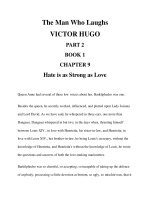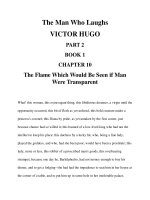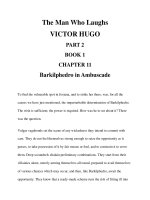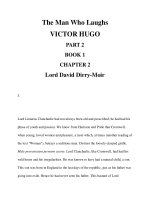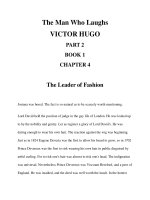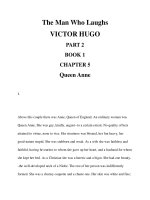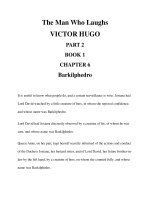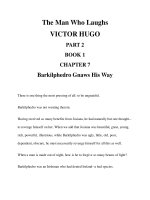The Man Who Laughs VICTOR HUGO PART 2 BOOK 1 CHAPTER 10 ppt
Bạn đang xem bản rút gọn của tài liệu. Xem và tải ngay bản đầy đủ của tài liệu tại đây (31.01 KB, 12 trang )
The Man Who Laughs
VICTOR HUGO
PART 2
BOOK 1
CHAPTER 10
The Flame Which Would Be Seen if Man
Were Transparent
What! this woman, this extravagant thing, this libidinous dreamer, a virgin until the
opportunity occurred, this bit of flesh as yet unfreed, this bold creature under a
princess's coronet; this Diana by pride, as yet untaken by the first comer, just
because chance had so willed it; this bastard of a low-lived king who had not the
intellect to keep his place; this duchess by a lucky hit, who, being a fine lady,
played the goddess, and who, had she been poor, would have been a prostitute; this
lady, more or less, this robber of a proscribed man's goods, this overbearing
strumpet, because one day he, Barkilphedro, had not money enough to buy his
dinner, and to get a lodging she had had the impudence to seat him in her house at
the corner of a table, and to put him up in some hole in her intolerable palace.
Where? never mind where. Perhaps in the barn, perhaps in the cellar; what does it
matter? A little better than her valets, a little worse than her horses. She had abused
his distress his, Barkilphedro's in hastening to do him treacherous good; a thing
which the rich do in order to humiliate the poor, and to tie them, like curs led by a
string. Besides, what did the service she rendered him cost her? A service is worth
what it costs. She had spare rooms in her house. She came to Barkilphedro's aid! A
great thing, indeed. Had she eaten a spoonful the less of turtle soup for it? had she
deprived herself of anything in the hateful overflowing of her superfluous luxuries?
No. She had added to it a vanity, a luxury, a good action like a ring on her finger,
the relief of a man of wit, the patronization of a clergyman. She could give herself
airs: say, "I lavish kindness; I fill the mouths of men of letters; I am his
benefactress. How lucky the wretch was to find me out! What a patroness of the
arts I am!" All for having set up a truckle bed in a wretched garret in the roof. As
for the place in the Admiralty, Barkilphedro owed it to Josiana; by Jove, a pretty
appointment! Josiana had made Barkilphedro what he was. She had created him.
Be it so. Yes, created nothing less than nothing. For in his absurd situation he felt
borne down, tongue-tied, disfigured. What did he owe Josiana? The thanks due
from a hunchback to the mother who bore him deformed. Behold your privileged
ones, your folks overwhelmed with fortune, your parvenus, your favourites of that
horrid stepmother Fortune! And that man of talent, Barkilphedro, was obliged to
stand on staircases, to bow to footmen, to climb to the top of the house at night, to
be courteous, assiduous, pleasant, respectful, and to have ever on his muzzle a
respectful grimace! Was not it enough to make him gnash his teeth with rage! And
all the while she was putting pearls round her neck, and making amorous poses to
her fool, Lord David Dirry-Moir; the hussy!
Never let any one do you a service. They will abuse the advantage it gives them.
Never allow yourself to be taken in the act of inanition. They would relieve you.
Because he was starving, this woman had found it a sufficient pretext to give him
bread. From that moment he was her servant; a craving of the stomach, and there is
a chain for life! To be obliged is to be sold. The happy, the powerful, make use of
the moment you stretch out your hand to place a penny in it, and at the crisis of
your weakness make you a slave, and a slave of the worst kind, the slave of an act
of charity a slave forced to love the enslaver. What infamy! what want of
delicacy! what an assault on your self-respect! Then all is over. You are sentenced
for life to consider this man good, that woman beautiful; to remain in the back
rows; to approve, to applaud, to admire, to worship, to prostrate yourself, to blister
your knees by long genuflections, to sugar your words when you are gnawing your
lips with anger, when you are biting down your cries of fury, and when you have
within you more savage turbulence and more bitter foam than the ocean!
It is thus that the rich make prisoners of the poor.
This slime of a good action performed towards you bedaubs and bespatters you
with mud for ever.
An alms is irremediable. Gratitude is paralysis. A benefit is a sticky and repugnant
adherence which deprives you of free movement. Those odious, opulent, and
spoiled creatures whose pity has thus injured you are well aware of this. It is done-
-you are their creature. They have bought you and how? By a bone taken from
their dog and cast to you. They have flung that bone at your head. You have been
stoned as much as benefited. It is all one. Have you gnawed the bone yes or no?
You have had your place in the dog-kennel as well. Then be thankful be ever
thankful. Adore your masters. Kneel on indefinitely. A benefit implies an
understood inferiority accepted by you. It means that you feel them to be gods and
yourself a poor devil. Your diminution augments them. Your bent form makes
theirs more upright. In the tones of their voices there is an impertinent inflexion.
Their family matters their marriages, their baptisms, their child-bearings, their
progeny all concern you. A wolf cub is born to them. Well, you have to compose
a sonnet. You are a poet because you are low. Isn't it enough to make the stars fall!
A little more, and they would make you wear their old shoes.
"Who have you got there, my dear? How ugly he is! Who is that man?"
"I do not know. A sort of scholar, whom I feed."
Thus converse these idiots, without even lowering their voice. You hear, and
remain mechanically amiable. If you are ill, your masters will send for the doctor
not their own. Occasionally they may even inquire after you. Being of a different
species from you, and at an inaccessible height above you, they are affable. Their
height makes them easy. They know that equality is impossible. By force of
disdain they are polite. At table they give you a little nod. Sometimes they
absolutely know how your name is spelt! They only show that they are your
protectors by walking unconsciously over all the delicacy and susceptibility you
possess. They treat you with good-nature. Is all this to be borne?
No doubt he was eager to punish Josiana. He must teach her with whom she had to
deal!
O my rich gentry, because you cannot eat up everything, because opulence
produces indigestion seeing that your stomachs are no bigger than ours, because it
is, after all, better to distribute the remainder than to throw it away, you exalt a
morsel flung to the poor into an act of magnificence. Oh, you give us bread, you
give us shelter, you give us clothes, you give us employment, and you push
audacity, folly, cruelty, stupidity, and absurdity to the pitch of believing that we are
grateful! The bread is the bread of servitude, the shelter is a footman's bedroom,
the clothes are a livery, the employment is ridiculous, paid for, it is true, but
brutalizing.
Oh, you believe in the right to humiliate us with lodging and nourishment, and you
imagine that we are your debtors, and you count on our gratitude! Very well; we
will eat up your substance, we will devour you alive and gnaw your heart-strings
with our teeth.
This Josiana! Was it not absurd? What merit had she? She had accomplished the
wonderful work of coming into the world as a testimony of the folly of her father
and the shame of her mother. She had done us the favour to exist, and for her
kindness in becoming a public scandal they paid her millions; she had estates and
castles, warrens, parks, lakes, forests, and I know not what besides, and with all
that she was making a fool of herself, and verses were addressed to her! And
Barkilphedro, who had studied and laboured and taken pains, and stuffed his eyes
and his brain with great books, who had grown mouldy in old works and in
science, who was full of wit, who could command armies, who could, if he would,
write tragedies like Otway and Dryden, who was made to be an emperor
Barkilphedro had been reduced to permit this nobody to prevent him from dying of
hunger. Could the usurpation of the rich, the hateful elect of chance, go further?
They put on the semblance of being generous to us, of protecting us, and of smiling
on us, and we would drink their blood and lick our lips after it! That this low
woman of the court should have the odious power of being a benefactress, and that
a man so superior should be condemned to pick up such bribes falling from such a
hand, what a frightful iniquity! And what social system is this which has for its
base disproportion and injustice? Would it not be best to take it by the four corners,
and to throw pell-mell to the ceiling the damask tablecloth, and the festival, and the
orgies, and the tippling and drunkenness, and the guests, and those with their
elbows on the table, and those with their paws under it, and the insolent who give
and the idiots who accept, and to spit it all back again in the face of Providence,
and fling all the earth to the heavens? In the meantime let us stick our claws into
Josiana.
Thus dreamed Barkilphedro. Such were the ragings of his soul. It is the habit of the
envious man to absolve himself, amalgamating with his personal grievance the
public wrongs.
All the wild forms of hateful passions went and came in the intellect of this
ferocious being. At the corners of old maps of the world of the fifteenth century are
great vague spaces without shape or name, on which are written these three words,
Hic sunt leones. Such a dark corner is there also in man. Passions grow and growl
somewhere within us, and we may say of an obscure portion of our souls, "There
are lions here."
Is this scaffolding of wild reasoning absolutely absurd? does it lack a certain
justice? We must confess it does not.
It is fearful to think that judgment within us is not justice. Judgment is the relative,
justice is the absolute. Think of the difference between a judge and a just man.
Wicked men lead conscience astray with authority. There are gymnastics of
untruth. A sophist is a forger, and this forger sometimes brutalizes good sense.
A certain logic, very supple, very implacable, and very agile, is at the service of
evil, and excels in stabbing truth in the dark. These are blows struck by the devil at
Providence.
The worst of it was that Barkilphedro had a presentiment. He was undertaking a
heavy task, and he was afraid that after all the evil achieved might not be
proportionate to the work.
To be corrosive as he was, to have within himself a will of steel, a hate of
diamond, a burning curiosity for the catastrophe, and to burn nothing, to decapitate
nothing, to exterminate nothing; to be what he was, a force of devastation, a
voracious animosity, a devourer of the happiness of others, to have been created
(for there is a creator, whether God or devil), to have been created Barkilphedro all
over, and to inflict perhaps after all but a fillip of the finger could this be
possible? could it be that Barkilphedro should miss his aim? To be a lever
powerful enough to heave great masses of rock, and when sprung to the utmost
power to succeed only in giving an affected woman a bump in the forehead to be
a catapult dealing ruin on a pole-kitten! To accomplish the task of Sisyphus, to
crush an ant; to sweat all over with hate, and for nothing at all. Would not this be
humiliating, when he felt himself a mechanism of hostility capable of reducing the
world to powder! To put into movement all the wheels within wheels, to work in
the darkness all the mechanism of a Marly machine, and to succeed perhaps in
pinching the end of a little rosy finger! He was to turn over and over blocks of
marble, perchance with the result of ruffling a little the smooth surface of the
court! Providence has a way of thus expending forces grandly. The movement of a
mountain often only displaces a molehill.
Besides this, when the court is the dangerous arena, nothing is more dangerous
than to aim at your enemy and miss him. In the first place, it unmasks you and
irritates him; but besides and above all, it displeases the master. Kings do not like
the unskilful. Let us have no contusions, no ugly gashes. Kill anybody, but give no
one a bloody nose. He who kills is clever, he who wounds awkward. Kings do not
like to see their servants lamed. They are displeased if you chip a porcelain jar on
their chimney-piece or a courtier in their cortège. The court must be kept neat.
Break and replace; that does not matter. Besides, all this agrees perfectly with the
taste of princes for scandal. Speak evil, do none; or if you do, let it be in grand
style.
Stab, do not scratch, unless the pin be poisoned. This would be an extenuating
circumstance, and was, we may remember, the case with Barkilphedro.
Every malicious pigmy is a phial in which is enclosed the dragon of Solomon. The
phial is microscopic, the dragon immense. A formidable condensation, awaiting
the gigantic hour of dilation! Ennui consoled by the premeditation of explosion!
The prisoner is larger than the prison. A latent giant! how wonderful! A minnow in
which is contained a hydra. To be this fearful magical box, to contain within him a
leviathan, is to the dwarf both a torture and a delight.
Nor would anything have caused Barkilphedro to let go his hold. He awaited his
time. Was it to come? What mattered that? He watched for it. Self-love is mixed up
in the malice of the very wicked man. To make holes and gaps in a court fortune
higher than your own, to undermine it at all risks and perils, while encased and
concealed yourself, is, we repeat, exceedingly interesting. The player at such a
game becomes eager, even to passion. He throws himself into the work as if he
were composing an epic. To be very mean, and to attack that which is great, is in
itself a brilliant action. It is a fine thing to be a flea on a lion.
The noble beast feels the bite, and expends his mighty anger against the atom. An
encounter with a tiger would weary him less; see how the actors exchange their
parts. The lion, humiliated, feels the sting of the insect; and the flea can say, "I
have in my veins the blood of a lion."
However, these reflections but half appeased the cravings of Barkilphedro's pride.
Consolations, palliations at most. To vex is one thing; to torment would be
infinitely better. Barkilphedro had a thought which returned to him without
ceasing: his success might not go beyond just irritating the epidermis of Josiana.
What could he hope for more he so obscure against her so radiant? A scratch is
worth but little to him who longs to see the crimson blood of his flayed victim, and
to hear her cries as she lies before him more than naked, without even that garment
the skin! With such a craving, how sad to be powerless!
Alas, there is nothing perfect!
However, he resigned himself. Not being able to do better, he only dreamed half
his dream. To play a treacherous trick is an object after all.
What a man is he who revenges himself for a benefit received! Barkilphedro was a
giant among such men. Usually, ingratitude is forgetfulness. With this man,
patented in wickedness, it was fury. The vulgar ingrate is full of ashes; what was
within Barkilphedro? A furnace furnace walled round by hate, silence, and
rancour, awaiting Josiana for fuel. Never had a man abhorred a woman to such a
point without reason. How terrible! She was his dream, his preoccupation, his
ennui, his rage.
Perhaps he was a little in love with her.
